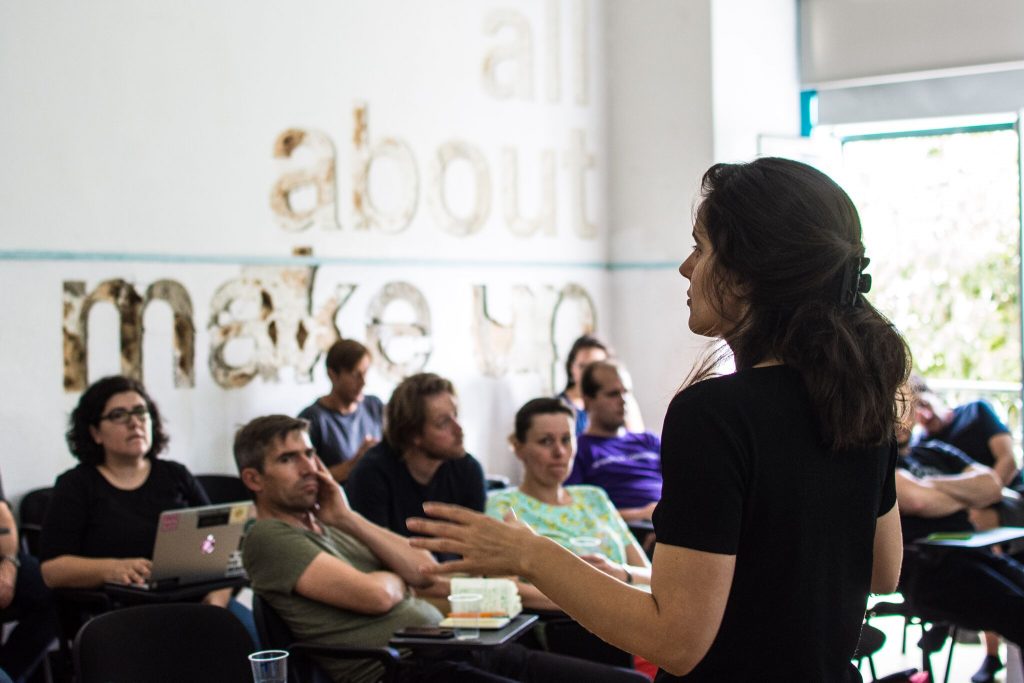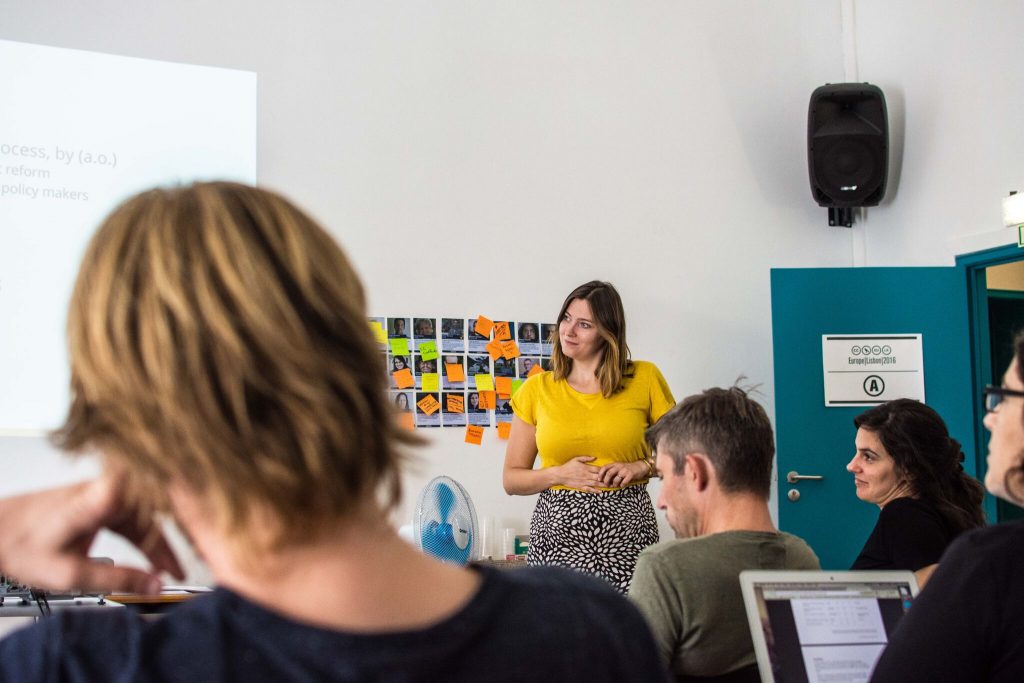This post was written by Natalia Mileszyk and Lisette Kalshoven of COMMUNIA.
 Photo by Saša Krajnc, CC BY 4.0.
Photo by Saša Krajnc, CC BY 4.0.
Last week at the Creative Commons Europe Meeting in Lisbon, COMMUNIA organised a “School of Rock(ing) Copyright” workshop. Creative Commons affiliates from Poland, the Netherlands, and Portugal joined efforts in sharing knowledge about the current European copyright reform. We examined the political process for updating the copyright rules, and asked for help from other CC Europe affiliates in advocating for positive copyright changes. We were pleased to have around 15 participants from as many EU countries attend the session. Since we’re at a crucial stage within the European legislative process, we were eager to discuss the ins and outs on how we can create a better copyright for Europe.
Why does the CC community care about copyright reform? We all stand for creativity, innovation, access to knowledge, and development. Copyright can both boost or limit these goals, so we are actively involved to make progressive changes to copyright to benefit users, education, and the commons.
What we presented at the workshop
At the ‘school’ we focused on four different areas that people need to know about when engaging in advocacy for copyright reform in Europe. First, we provided a quick overview on ‘Brussels’ and how the different institutions such as the European Commission and Parliament interact. Second, we explained how the legislative process works. The Commission proposal is out, but it’s far from the end of the process! Third, we shared tactics and tips for getting involved in advocacy activities. These often seem obvious, but are very important when interacting with politicians. For example: never ask for anything people can’t give you, and come to the table with clear, concise suggestions. Few politicians have the time to read a 200 page research report, no matter how riveting we think it is! The fourth and last part of our workshop dug into a few key topics within the current copyright reform proposal, including areas such as cultural heritage, education, and research.
 Photo by Saša Krajnc, CC BY 4.0.
Photo by Saša Krajnc, CC BY 4.0.
What’s in Commission’s proposed Directive on copyright?
You can read the entire proposal here, and read COMMUNIA’s high level analysis about it here.
In short, the Commission’s copyright proposal fails to meet the needs of citizens, educators, and researchers across Europe. Instead of strengthening the information economy, the proposal preserves a status quo defined in the analog age. In the process, it hinders education, research, and cultural expression.
The Commission’s proposal focuses on a wholly different goal: to minimize the impact of the fundamental changes brought about by digital technologies and the internet on legacy business models. Publishers get an ancillary copyright that already has proven itself worthless in practice. Access to most audio-visual content will continue to be hampered by geo-blocking (which the Commission had earlier committed to end), and online platforms might be forced to collaborate with rights holders on censoring content that is shared by users on these platforms. The whole package lacks forward-looking, innovation-friendly measures that embrace digitization as an opportunity for users, creators, businesses, and public institutions in Europe.
During our workshop, we explored three aspects of the proposal in greater detail: 1) text and data mining (with a limited exception that limits research to official institutions), 2) cultural heritage (which does not solve the problem heritage institutions have with making their collections available online), and 3) education (where the proposal overcomplicates the situation, making it even harder for teachers to focus on providing excellent education.
We need more advocates to push for positive change
Creative Commons is committed to advocating for a better copyright across the globe, including Europe. Several affiliates at the School of Rock(ing) Copyright event stepped forward to help advocate for positive change. We need to engage in a variety of tactics, including educating MEPs about what’s at stake, responding to consultations on the copyright reform, and organising events and actions to raise public awareness. We look forward to collaborating even more with our fellow affiliates to make sure we get a copyright reform for Europe that’s fit for the digital age.
What you can do now!
- Keep up-to-date with the European Copyright Reform process. Follow along with the COMMUNIA blog and twitter, and CC blog and twitter.
- Take part in the national consultations now being held in many Member States. Check to see the consultation deadline of your national ministry responsible for copyright. Do your best to motivate other organisations to take part in the consultation.
- Talk to your representatives within your national government, your European Parliament Representatives, and fellow advocates at other organisations. And remember, the most important is to make your voice heard about why this matters to you.
- Share information with others. Let’s keep each other in the loop about our advocacy activities, meetings, and best arguments. You can also become a member of COMMUNIA (highly recommended!) Let us know.
- Engage with your local communities. Inform your friends and social groups about what’s at stake. Organise debate nights, salons, and share interesting resources.
- Think about how you want to engage: for the topics that you love, create a factsheet, organise a meeting, write happy (or angry) tweets to Commissioners.
Making your voice heard is fundamental, the way you do it is up to you. Let us know how we can help!






